- Home
- Kim Newman
Moriarty: The Hound of the D'Urbervilles Page 6
Moriarty: The Hound of the D'Urbervilles Read online
Page 6
The man on the roof decided it was time to take his shot. His finger had probably been itching all evening. I’ve had trouble with fools like that on safari, so keen on not coming home without having cleaned the barrel, they need to fire an elephant gun at the regimental water bearer just so they could say they’ve killed something.
Lassiter was quicker than a Bhishti, and not struggling with a ridiculously overweighted yard-and-a-half of rifle.
The keen rifleman tumbled dead into the flowery bower around the front door.
Seven, minus three. Four.
‘Drop the ironmongery, Elder,’ I ordered.
Rache blew a loud raspberry.
Drebber was shaking. He nodded, and guns fell onto the road.
‘All of them,’ I said.
Hands went to belts and inside pockets and boots and special compartments and a variety of hold-out single-shots and throwing knives rattled down as well.
‘Now, take your dead folks and scarper.’
The four surviving Danites did as they were told. The fellow in the bower was a sixteen-stone lump of his many wives’ cooking and it took two to lift him.
They had a carriage down the road, and it trundled off.
Not a bad night’s work, I thought. Providing it was over.
Rache was dancing around, and I thought it a good idea to relieve Missy Surprise of her .45 calibre insides. I gave the doll back and the girl loved it none the less for not having a head.
Jane was looking at me with something like rapt gratitude. Usually a good moment to make a proposition. I doubted my currency with Jim Lassiter stood as high as that.
‘Colonel Arbuthnot, what can we ever do to repay you?’
‘You can die,’ said a voice I recognised. ‘Yes, die.’
IX
I was fuming.
Moriarty didn’t deign to explain, but I had caught up on it.
Of course, he knew the Danites would try to save the fee and go for the kills on their own.
Of course, he had mentioned the Laurence address deliberately, to prompt fast action.
Of course, he had followed me and watched my travails all evening long, not intervening until the danger was over.
Of course, he had found a way to profit.
He strolled up the street, head bobbing. He was dressed all in black, for the night-time. He also had a carriage parked nearby, with Chop, his Chinese coachman, perched up on the box. He enquired solicitously after the neighbour, who was still making a performance of being slightly shot. Somehow, the man got the notion he had been saved by my intervention from a conspiracy of high-ranking Masons who wanted him dead over some imagined slight. It would be a risky proposition to complain officially about such well-connected villains since they owned the police. He bustled inside and drew his curtains, hoping to hide from inescapable doom under his coverlets.
Then Moriarty applied himself to the murders.
I was not privy to the arrangements the Professor made with Lassiter and Jane. I had to be in the still-smoky parlour, while Rache – excited to be up long past her bedtime – banged at the gutshot piano while singing more verses of her butterfly song.
At the conclusion of negotiations, Moriarty was proud owner, through hard-to-trace holding companies, of the Surprise Valley Gold Mine. Amusingly, he was now a major employer in Amber Springs, Utah.
Jim Lassiter/Jonathan Laurence, Jane Withersteen/Helen Laurence and Little Fay Larkin/Rachel Laurence were dead, burned to crackling in the smoking ruins of The Laurels, Streatham Hill Road. It was the gas mains, apparently. And the neighbours had some stories to tell.
What amazed me most was that the Professor had the corpses ready. Chop and I had to wrestle them into beds before the fatal match was struck. I suspected three strangers of the right ages had been ‘burked’, but Moriarty assured Jane the substitutes were ‘natural causes’ paupers rescued from anatomists’ tables. She believed him, and that’s what counts with women like her.
He had a satchel full of documents: passports, birth certificates, twenty-year-old letters, used steamer tickets, bank books, even photographs. If the Lassiter/Laurences wanted to assume other identities, they should have come to him in the first place – when it would have cost less than a gold mine. He let Mr and Mrs Ronald Lembo of Ottowa keep a private fortune of, amusingly enough, £205,000, deposited at Coutts. Not unlimited wealth, but most people should be able to live comfortably on the interest. I’d run through it inside a week.
Jane said the Professor was a wonderful man, but Lassiter knew better. He went along, but knew he’d been bushwhacked. I now think Moriarty even contrived for Drebber to come across the Laurences in the first place. For him, a fugitive in possession of a fabulous gold mine is someone who needs their exile life turned upside down.
Rache was afraid of the man. She wasn’t stupid, just different. She would have to learn a new name, Pixie, and address her parents as Uncle and Aunt, but they’d adopted her in the first place.
Along with the evidence of full lives lived from birth up to this minute, the Lembos found that they had been staying – in a suite at Claridge’s! – in London for several days. Travelling trunks, including entire wardrobes, were ensconced there. I had no doubt the staff would recognise them and they’d be offered their ‘usual’ at breakfast the next day. The family were on a long, leisurely world tour and had tickets and reservations for Paris, Strelsau, Constantinople, and points east. Eventually they would fetch up in Perth, Australia.
In the coach on the way back to Conduit Street, I asked about Drebber and Stangerson.
‘If anyone deserves to be murdered,’ I said, ‘it’s those splitters.’
The Professor smiled. ‘And who will pay us for these murders?’
‘Those two I’d slaughter for free.’
‘Bad business, giving away what we charge for. You won’t find Mrs Halifax bestowing favours “on the house”. No, if we were to take steps against the Danites, we would only expose ourselves to risk. Besides, as you know, giving out an address is often a far more deadly instrument than a gun or a knife.’
I didn’t understand and said so.
‘Elder Drebber mentioned another enemy of the Danites, one Mr Jefferson Hope. Not a fugitive, in this case, but a pursuer. A man with a deadly grudge against our clients which dates back to a business in America which is too utterly tiresome to go into at this late hour.’
‘Drebber was half expecting to run across Hope,’ I said.
‘More like he was expecting Hope to run across him. This is even more likely now. I’ve sent an unsigned telegram to Mr Hope, who is toiling as a cab driver in this city. It mentions a boarding house in Torquay Terrace, Camberwell, where he might find Drebber and Stangerson. I gather they will try to get a train for Liverpool soon, and a passage home, so I impressed on Hope that he should be swiftly about his business.’
Moriarty chuckled.
If you read in the papers about the Lauriston Gardens murder, the Halliday’s Private Hotel poisoning and death ‘in police custody’ of the suspect cabman, you’ll understand. [3] When the Professor sets abut tidying up, slates are wiped clean, broken up and buried under a foundation stone.
So, at the end of it all, I was in residence at Conduit Street, part of the family. I was the Number Two in the Firm, the Man in Charge of Murder, but had a sense of how far beneath the Number One that position ranked. I had been near-hanged and shot at, but – most of all – kept out of the grown-ups’ business. Like Rache, good enough to spring the big surprise but otherwise fondly indulged or tolerated, I wasn’t party to serious haggling, just the bloke with the gun and the steady nerve.
Still, I knew how I would even things. I began to keep a journal. All the facts are set down, and eventually the public shall know them.
Then we’ll see whose face is red. No, vermilion.
CHAPTER TWO: A SHAMBLES IN BELGRAVIA
I
To Professor Moriarty, she is always that bitch.
&n
bsp; Irene Adler arrived in our Conduit Street rooms shortly after I undertook to assist my fellow tenant in enterprises of which he was the pre-eminent London specialist. In short, sirrah, crime.
The old bread and honey came into it, of course [1]. The Professor had me on an honorarium of six thousand pounds per annum. Scarcely enough to make anyone put up with Moriarty, actually, but it serviced my predilection for pursuits the naïve refer to as ‘games of chance’. However, I own that the thrill of do-baddery attracted me, that blood-running whoosh of fright and delight which comes from cocking repeated snooks at every plod, beak and turnkey in the land. When a hunting man has grown bored with bagging tigers, crime can still jangle the nerves and keep up the pecker. The bloodless Moriarty got his jollies in the abstract, plotting felony the way you might play a hand of patience. I’ve heard him say the business of committing the crime itself is but a tiresome necessity, the practical proof of a theorem already solved to his satisfaction.
That morning, the Professor was thinking through two problems. A portion of his brain was calculating the timings of solar eclipses observable in far-flung regions. Superstitious natives can sometimes be persuaded that a white man has power over the sun and needs to be given handy tribal treasures if bwana sahib promises to turn the light on again. Bloody good trick, if you can get away with it [2]. The greater part of his attention, however, was devoted to the breeding of wasps.
‘Your bee is a law-abiding soul,’ he said, in his reedy lecturing voice, ‘as reverent to their queen as the clods of England, dedicated to the production of honey for the betterment of all, buzzing about promiscuously pollinating to please addle-minded poets. They only defend themselves at the cost of their lives, for they sting but once. Volumes are devoted to the care of bees, and apiculture exists to exploit their good nature. Wasps do nothing but sting. Persistently venomous, they fly from one assault to the next. Unwelcome everywhere. Thoroughly nasty sorts. We are not bees, Moran.’
He smiled, a creepy thing for a man with lips as thin as his. His near-fleshless head moved from side to side. I couldn’t follow Moriarty’s drift, but that was usual. I nodded and hoped he would come, eventually, to a point. A schoolmaster before taking to villainy, his rambles tended to wind towards some inverted moral.
‘Summer will be upon us soon,’ he mused, ‘the season for picnicking in the park, for tiny fat arms to go bare, for governesses to sit and gossip unveiled, for shop girls and their beaux to spoon in public. This will be a bumper year for our yellow-and-black-striped friends. My first generation of polistes pestilentialis is hatching. The world is divided, Moran, between those who sting and those who are the stingees.’
‘And you would be the sting-ers,’ shrilled that voice.
The American Nightingale had been admitted by Mrs Halifax.
‘Miss Irene Adler,’ acknowledged Moriarty. ‘Your Lucia di Lammermoor was acceptable, your Maria Stuarda indifferent and you were perhaps the worst Emilia di Liverpool the stage has ever seen.’ [3]
‘What a horrible man you are, James Moriarty!’
His lips split and sharp teeth showed.
‘My business is being horrible, Miss Adler. I make no effort at sham or hypocrisy.’
‘That, I must say, is a tonic.’
She smiled full-bore and arranged herself on a divan, prettily hiking her hemline up over well-turned ankles, shifting her décolletage in a manner calculated to set her swanny mams a-wobble. Even Moriarty was impressed, and he could keep up a lecture on the grades of paper used in the forgery of high-denomination Venezuelan banknotes while walking down the secret corridor with the row of one-way mirror windows into the private rooms where Mrs H.’s girls conducted spectacularly indecent business day and night.
I still maintain all would have been well if only I’d shown the Adler minx what was what straight off, tossed her skirts over her head, plonked her fizzog-down on the reception room rug (a tiger whose head snarled as if he still bore a grudge from that tricky shot I made bringing him down) and administered one of my famous Specials. Had I but properly poked that Yankee popsy, she might have broken the habit which eventually set all manner of odd bods scurrying around trying to clear up her confounded messes.
Irene Adler had the face of an angel child, the body of a full-grown trollop and a voice like a steel needle slowly sliding into your brain. Even warbling to an audience of tone-deaf Polish, she hadn’t lasted as prima donna. After her Emilia flopped so badly the artistic director of the Warsaw Opera had to blow his brains out, the company cut her adrift, leaving her on the loose in Europe to the disadvantage of several ruling houses.
And here she was on our settee.
‘You are aware that the services I offer are somewhat unusual?’ the Professor said.
She fixed Moriarty with a steely glint that cut through all the sugar.
‘I am a soprano from New Jersey,’ she began, pronouncing it ‘Noo Joisey’. ‘I know what a knob crook looks like. You can figure all the sums you like, Professor, but you’re as much a capo di cosa nostra as the Moustache Petes in the back room of the Burly-Cue. Which is dandy, because I have a job of burglary that needs doing urgently. Capisce?’
The Professor nodded.
‘Who’s the red-faced gent who hasn’t taken his glims off my teats for the last minute and a half?’
‘Colonel Sebastian Moran, the heavy-game shot.’
‘Good with a gun, eh? Looks more like a shiv-man to me.’
She pointed her index fingers at her cleavage, which she thrust out, then angled her fingertips up to indicate her face.
‘That’s better. Look me in the lamps, Colonel.’
I harrumphed and paid attention. If she hadn’t wanted fellows to ogle, she shouldn’t have worn that dress. There’s no reasoning with women.
‘Here’s the thing of it,’ she said. ‘Have you heard of the Duke of Strelsau?’
‘Michael Elphberg, so-called “Black Michael”, third in line to the throne of Ruritania.’
‘That’s the fellow, Prof. Things being slow this season, I’ve been knocking around a bit with Black Mike. They call him that because of his hair, which is dark where the rest of his family’s is flame-red. He’s a gloomy, glowering type as well so it suits him on temperamental grounds too. As it happens, photographs were taken of the two of us in the actual pursuit of knocking around. Artistic studies, you might say. Six plates. Full figures. Complete exposures. It would ruin my reputation should they come to light. You see, I’m being blackmailed!’
Her voice cracked. She raised a kerchief to her eye to quell a tear, then froze, a picture of slighted maidenhood. Moriarty shook his head. She stuffed the hankie back into her sleeve and snorted.
‘Worth a try just to keep my hand in. I’m a better actress than critics say, don’t you know? Obviously, I’m not being blackmailed. Like you said, there are stingers and stingees. We are stingers.’
‘And the stingee?’
‘Another bloody colonel. Colonel Sapt. Chief of the Ruritanian Secret Police. Which has been a dozy doddle for the last thirty years, since it’s one of the most peaceable, least-insurrection-blighted spots on the map. Not so much as a whiff of dissent since forty-eight. When, admittedly, the mob burned down the old White Palace. There are very scenic gardens on the site. Anyway, intrigue stirs. King Rudolf is getting on, and there’s some doubt about who gets the throne next. Rudolf the Red, the Crown Prince, is set on shoring up his case by marrying his cousin, Princess Flavia. Where do they get these names? If you put them in an opera, you’d be laughed off stage. Rudolf is fond of a tipple and a tumble, and Black Michael would like to paint himself as the more responsible, conscientious brother. He hopes, for some bizarre reason, to appeal to the people and be acclaimed a worthy sovereign if Rudolf trips up a few more times and does something silly like not arriving at his own coronation. Sapt is loyal to Rudolf, and dead set against Michael. Lord knows why, but there you are. Some people are like that. He’s also a keen appreciator of
the aesthetic worth of a fine photo.’
‘I see,’ I said, ‘this Sapt thinks to blacken Michael’s name – further blacken, I suppose – so the duke will never be king.’
Irene Adler looked at me with something like contemptuous pity.
‘Horse feathers, Colonel of the Nuts. If those pics were seen, Black Mike’d be the envy of Europe. He’d be crowned in a wave of popularity. Everyone loves a randy royal. Look at Vicky’s brood. No, Sapt wants the photographs off the market, so Mikey can be nagged into marriage by Antoinette de Mauban, his persistently pestering mistress. Which would scupper any chance he might have with Flavourless Flavia.’
‘You said Rudolf was engaged to the princess?’
She made a gesture, suggesting the matter was in the balance. ‘Whichever Elphberg marries Flavia is a cert to be king. She’s second in line. Black Michael is scheming to cut his half-brother out. Are you following this?’ [4]
Moriarty acknowledged that he was.
‘Why do you want those photographs?’
‘Sentimental value. I come off especially well in Study No. 3, where the light catches the fall of my hair as I lower my... No? Not convinced? Rats, I must work on this acting lark. Obviously, I want to blackmail everyone – Colonel Sapt, Black Mike, Red Rudi, Mademoiselle Toni, the princess... With half of Ruritania paying me to keep quiet and the other half to speak up, I should be able to milk the racket for a good few years – at least, until succession is settled – and secure my comfortable old age.’
She could not have been more than twenty-five.
‘And where might these “artistic studies” be found?’ Moriarty asked.
She dug into her reticule and produced a paper with a map drawn on it.
‘The Ruritanian Embassy in Belgravia,’ she said. ‘I have a collector’s interest in floorplans, schedules of guards, and the like.’
‘What’s this?’ the Professor indicated a detail marked with a red circle.

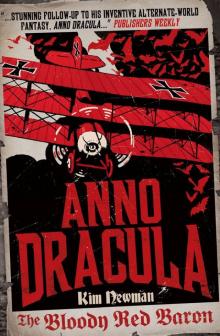 The Bloody Red Baron
The Bloody Red Baron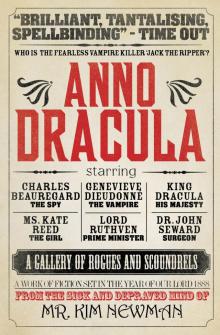 Anno Dracula
Anno Dracula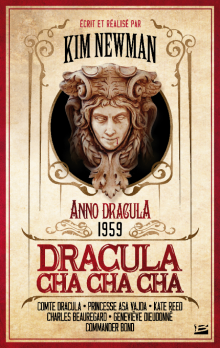 Dracula Cha Cha Cha
Dracula Cha Cha Cha Anno Dracula 1999
Anno Dracula 1999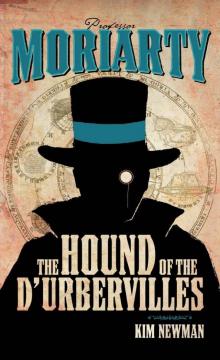 Moriarty: The Hound of the D'Urbervilles
Moriarty: The Hound of the D'Urbervilles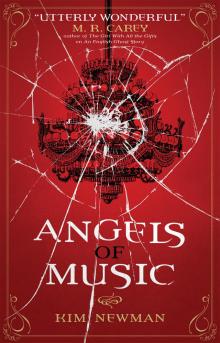 Angels of Music
Angels of Music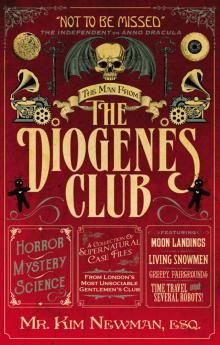 The Man From the Diogenes Club
The Man From the Diogenes Club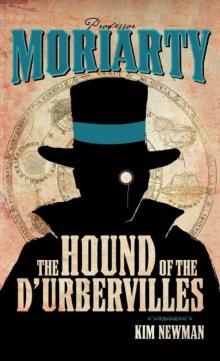 Professor Moriarty: The Hound Of The D’urbervilles
Professor Moriarty: The Hound Of The D’urbervilles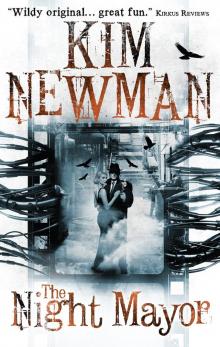 The Night Mayor
The Night Mayor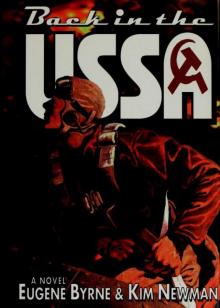 Back in the USSA
Back in the USSA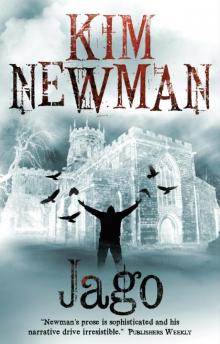 Jago
Jago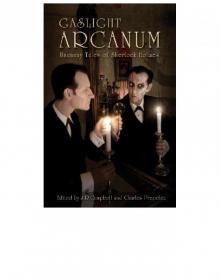 Gaslight Arcanum: Uncanny Tales of Sherlock Holmes
Gaslight Arcanum: Uncanny Tales of Sherlock Holmes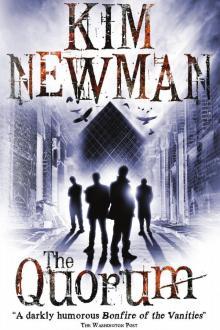 The Quorum
The Quorum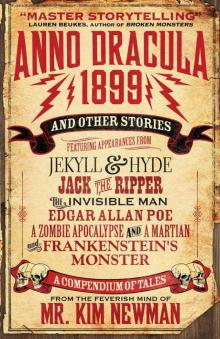 Anno Dracula 1899 and Other Stories
Anno Dracula 1899 and Other Stories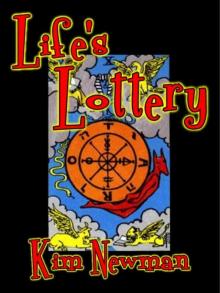 Life's Lottery
Life's Lottery The Secrets of Drearcliff Grange School
The Secrets of Drearcliff Grange School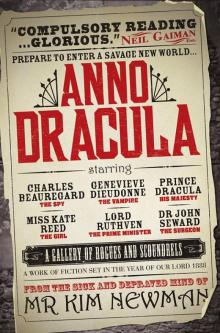 Anno Dracula ad-1
Anno Dracula ad-1 The Bloody Red Baron: 1918 ad-2
The Bloody Red Baron: 1918 ad-2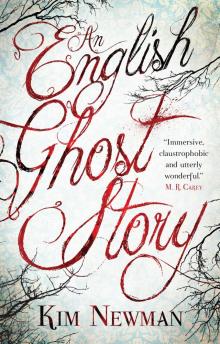 An English Ghost Story
An English Ghost Story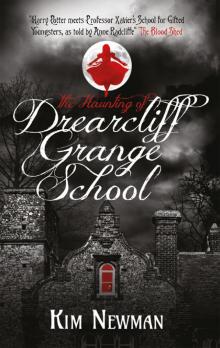 The Haunting of Drearcliff Grange School
The Haunting of Drearcliff Grange School The Other Side of Midnight
The Other Side of Midnight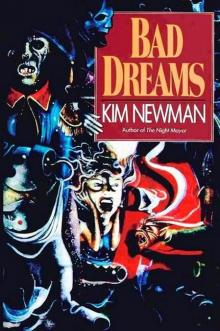 Bad Dreams
Bad Dreams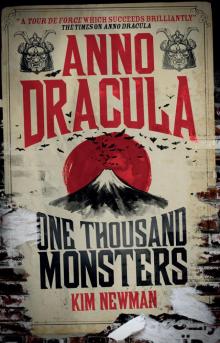 Anno Dracula--One Thousand Monsters
Anno Dracula--One Thousand Monsters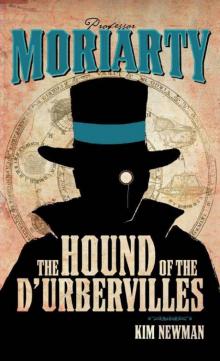 The Hound Of The D’urbervilles
The Hound Of The D’urbervilles The Bloody Red Baron: Anno Dracula 1918
The Bloody Red Baron: Anno Dracula 1918